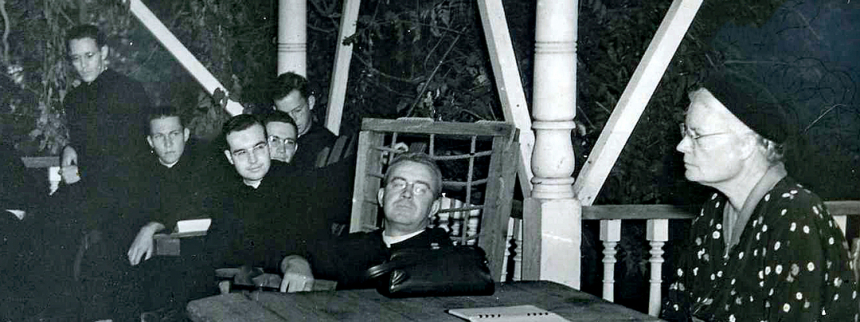
Dorothy Day, whose cause for canonization is being advanced by the Archbishop of New York, is best known as a tireless advocate for the poor. The movement she founded, the Catholic Worker, still provides food and shelter for the poor in cities across the United States (including Sacramento) and other parts of the world.
But Dorothy was also a radical pacificist and activist on picket lines (she was arrested multiple times), and her books and columns promoted a brand of Catholicism that made her a sign of contradiction for many. The FBI had a 500-page file on her and three times recommended to the attorney general that she be charged with sedition while at the same time, ironically, Time magazine included her in a cover story about “Living saints.”
Those who considered her a saint did so for good reason, however. Dorothy spent a significant part of her day in prayer – at least three hours – so much so that one wonders how she found time for all her social activism. Her special love was the Book of Psalms, a vestige of her Protestant upbringing, and those who knew her well say those verses punctuated her entire day. But she didn’t just take them directly from her Bible. She read them from the Breviary, the seven-step prayer that is read by priests, religious and many lay people every day. Her devotion to that prayer was total. While out on her many lecturing tours, for example, there were three things that had to be in her case: her diary, her Breviary and a jar of instant coffee, and she couldn’t say which was the most essential.
This devotion was reinforced by her intimate knowledge of Trappist monks. Dorothy became a regular visitor to Holy Ghost Monastery outside Atlanta, after one of her Catholic Worker volunteers entered that monastery, and thereafter their 24-hour cycle of prayer (which began at 2 a.m. or 3 a.m.) was on her mind when she prayed at home. It was as if she was modelling herself on those monks. One morning while on the road, she tells us in her diary, she woke up early -- at 4 a.m. – and blamed it on problems at work. But then a more spiritual thought overtook her: “Not quite as early as the Trappist monks.”
In addition to the Breviary, she loved the rosary. It was her favorite prayer when walking on the beach and she frequently turned to it when she couldn’t sleep at night. She was also a daily Mass-goer, and she loved to spend her afternoons in the little Italian church around the corner from the House of Hospitality in Manhattan, in order “to rest in the presence of Christ on the altar.”
Near the end of her life, when she couldn’t go to Mass anymore, she spent at least a half hour preparing to receive Communion and a half hour in thanksgiving afterwards. And, of course, she had her list of people for whom she prayed every day: atheist friends and Communist radicals from her past, as well as down-and-outs she met in the soup kitchen who later died on the streets or by suicide. Catholic Worker staff followed her example.
Not surprisingly, visitors to the soup kitchen often expressed surprise at this focus on prayer, and questioned the practicality of a movement that didn’t spend more time addressing the real problem – getting at the roots of poverty. In the face of such criticism, however, Dorothy pushed back, without apology: “If an outsider who comes to visit doesn’t pay attention to our praying and what that means, then he’ll miss the whole point of things.”
Does this sound like a dangerous subversive who deserved to be on J. Edgar Hoover’s watch list? Scarcely! But in a cover story about “Living saints?” Yes!
This is the first of a three-part series on Dorothy Day. In the Sept/Oct issue: Weekly confession and the sin that bothered her most.
Msgr. James Murphy is former associate publisher of Catholic Herald and rector emeritus of the Cathedral of the Blessed Sacrament.

